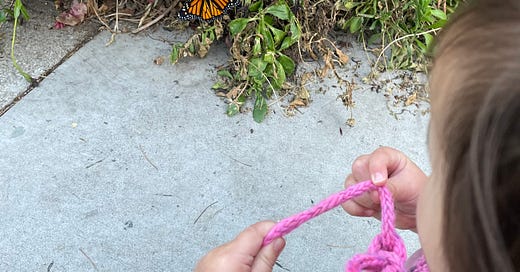Last week, I wrote about the magic of paying attention, and ever since, I’ve noticed how often I am not paying close attention to Aya. Of course, I always am on a functional level — making sure she’s not running into the street, etc. — but I’ve caught myself many times resembling Sosuke’s mother in Ponyo, a fiercely loving, busy mother, whose responses to his talking about magic are vague enough that we never know whether or not she really hears or believes him.
At this stage, Aya speaks a lot, but hearing her words as she intends them requires context. Yesterday on a walk, I thought I heard, “Papa work” (which she says often when Evan is at work).
“Yes, Papa is on a work trip,” I said.
“Papa work, Papa work,” she insisted, until I realized that she was pointing at purple string lights on a tree across the street. “Purple light!”
The kind of attention a toddler requires both takes and gives energy. When I can surrender to this kind of slow attention (with the right state of mind, which I can partially control, and enough time, which I mostly can’t), I sometimes feel like a fairy has opened a portal for me into another dimension I never realized I could access myself. Last week at the park, for example, Aya said, “All done, shoes?” and I thought it seemed a reasonable enough request, so I took off her shoes and socks. “Hi, toes,” she said, then looked at my feet. “Mama toes?”
“Do you want me to take off my shoes too?” I asked.
She nodded, so I took off my shoes, and she took my hand and led me slowly across the sandbox, behind the playground, over the blacktop to the clovered grass, up the hill to the trees whose roots we surveyed with our bare feet, too. The whole time she seemed entranced, giving devoted attention to our feet and the ground beneath them, and I let myself become entranced with her, holding her soft little hand.
As I write, I am already running out of time before daycare pickup. As a mother, I have a new kind of focus — caring for Aya is my most important responsibility. At the same time, I also feel a responsibility to keep my circle of care and attention wide, spreading beyond my family and friends to my neighborhood and extended community and the world. This requires a different kind of attention — to read the news means taking in atrocity at merciless speed. I feel myself like a clumsy camera lens, zooming in and out with physical effort.
My goal for Aya, and at the same time myself, is that she not be afraid of this effort or the inevitability of sometimes being out of focus. I want to believe that nurturing deep care for what is nearest to us — the clover among the grass, the tiny ants Aya likes to look for along the garden ledge each time we walk down the stairs of our building — translates to deep care for others’ lives — like the Palestinian kids cuddling with their cats and watching Ms. Rachel in the middle of a genocide, kids who deserve safety and protection as much as mine does. I don’t know how to teach Aya that our society is built on cruelty and injustice, while also teaching her that life is beautiful and worth living and that we have the agency to be creative and care fiercely for each other. But for her, I will learn.
Journaling prompt:
Imagining yourself as a child you are raising, what values do you want to teach yourself? How can you enact them in your daily life?
One thing I loved this week:
I am 24 years late to watching Y tu mamá también, but it partially inspired this post by making me think about different qualities and speeds of attention. It’s been a while since I’ve watched a good film (usually I watch trash TV that requires nothing from me mentally), but I loved the surprise of experiencing a piece of artwork that revealed its project slowly — a kind of antidote to the speed of social media, which I think rewards the bluntest, most obvious art (which is not all bad). Plus, Gael Garcia Bernal and Diego Luna.



